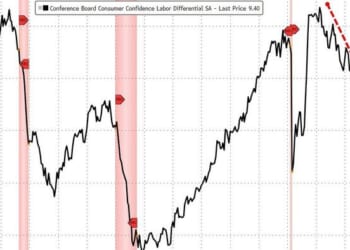Students are becoming savvier consumers when it comes to postsecondary education. In an AEI report published earlier this month, I documented that low-quality colleges are seeing massive declines in enrollment. These trends in consumer choice extend to what students elect to study once they arrive on campus. Increasingly, students are majoring in subjects with higher typical salaries.
In total, the Class of 2023 earned 2.1 million bachelor’s degrees—up from around 1.8 million degrees awarded to the Class of 2010. But almost all of that increase is down to rising interest in high-wage college majors such as engineering, computer science, and nursing.
The number of degrees conferred in fields of study where the median early-career salary exceeds $60,000 grew by 60 percent between 2010 and 2023. This accounted for almost all the rise in bachelor’s degree attainment during that time period. Combined, college majors paying lower starting salaries saw just an eight percent increase in degree conferrals over the same time frame.

Some college majors saw even faster growth. In particular, computer science has witnessed an explosion in student interest. The number of bachelor’s degrees awarded in computer science tripled between 2010 and 2023. Other high-wage majors also posted impressive growth: the number of four-year degrees awarded in nursing increased 96 percent, and engineering degrees rose by 63 percent.
In stark contrast to the lucrative majors, student interest in lower-earning majors has waned. The number of bachelor’s degrees awarded in English and linguistics declined 39 percent between 2010 and 2023. Other college majors with steep declines include history (down 38 percent), sociology and related social sciences (down 17 percent), and education (down 15 percent).

There are exceptions. Degrees conferred in low-wage fine arts barely budged; the same was true for generally more lucrative business degrees. But the overall trends clearly point towards students choosing college majors with higher salaries.
It’s not difficult to understand why. More Americans have called college’s value proposition into question. Students are terrified of taking on debt they won’t be able to repay.
According to a survey from the Pew Research Center, 47 percent of Americans say college is only worth it if you don’t have to take on debt. Another 29 percent say college is not worth it at all. But it hasn’t always been this way: polls show confidence in higher education has fallen precipitously over the past decade, though it saw a slight rebound this year.
Indeed, lower-earning majors are less likely to yield a financial payoff after taking into consideration the price of tuition, the opportunity cost of spending time out of the labor force, and the risk of starting college but not finishing. Around 23 percent of bachelor’s degrees have a negative return on investment after taking these factors into account.
It should therefore come as no surprise that more college students are “learning with their feet” by changing their majors to fields with better earning potential. Colleges pondering how to restore public confidence in their industry would do well to take stock of these trends—and consider what they can do to make higher education a better financial deal across the board.
The post Students Are Choosing College Majors With Higher Salaries appeared first on American Enterprise Institute – AEI.













